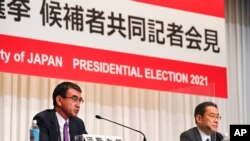The race to determine Japan’s next prime minister formally began Friday, with veteran Japanese politician Taro Kono appearing to hold a slim lead, opinion polls suggest.
Kono -- the country’s straight-talking, social media-savvy vaccine minister -- faces competition from three other candidates, who could force a run-off vote that could be even more uncertain.
Prime Minister Yoshihide Suga earlier this month announced he would resign, following a year-long premiership marked by public frustration over the government’s inability to contain the coronavirus.
Suga's resignation raises the possibility Japan will return to a period of revolving-door prime ministers that marked much of the past several decades.
What is almost certain is that Japan’s next prime minister will come from the ruling Liberal Democratic Party (LDP).
A conservative party that has dominated Japanese politics for decades, the LDP holds a majority in the lower house of parliament, meaning its upcoming leadership election will effectively determine the next prime minister.
Close race
The first round of voting is set for Sept. 29. Unlike last year’s leadership election, this year’s vote will involve both LDP lawmakers as well as ordinary party members.
Although most opinion polls suggest Kono leads, the race has taken several unexpected turns. Shigeru Ishiba, an influential LDP politician who many thought would run, this week announced he would instead endorse Kono.
Two women are also trying to become Japan’s first female prime minister.
Sanae Takaichi, 60, is a former internal affairs minister. She has been endorsed by former Prime Minister Shinzo Abe, the country's longest-serving prime minister. Takaichi comes from the party’s most conservative wing and has drawn headlines with her frequent visits to Tokyo’s Yasukuni Shrine, which honors the country’s war dead.
Seiko Noda, a 61-year-old former minister for gender equality, is a last-minute entrant to the race. Though she is widely seen as a longshot candidate, her presence makes it more difficult for any candidate to secure the majority of votes needed to win the first round outright.
“With more candidates, it is quite likely that we will see a second vote this time,” says Sebastian Maslow, who focuses on Japanese politics at Sendai Shirayuri Women’s College in Japan.
Making things even more uncertain, some LDP factions that usually vote as blocs this time are allowing members to make their own choice.
“All this makes this year’s LDP leadership race more competitive than previous ones,” Maslow says. “Although in my view I think dynamics seem to indicate that the party vote will ultimately go to Kono.”
If the election moves to a second round, the race would be decided mainly by LDP politicians, potentially further changing the political dynamic.
Kono: a straight-shooter
The 58-year-old Kono is a former defense minister and foreign minister. His latest job was heading up Japan’s coronavirus vaccine effort, which started slowly but has recently sped up.
Many in Japan know Kono for his humorous posts on Twitter. Though he has 2.4 million Twitter followers, Kono often replies to individuals, often in a self-deprecating manner.
“I would describe him as a straight-shooter,” says Purnendra Jain, who focuses on Japanese politics at the University of Adelaide. “Lots of LDP old guard people don’t like Kono because he says whatever he feels. He is not encumbered. So in a sense, he is quite popular among the young generation.”
A graduate of Georgetown University in Washington, D.C., Kono speaks fluent English -- a rarity among senior Japanese leaders.
On foreign policy, Kono has often struck a hawkish tone, particularly on China. He has suggested Japan should be open to spending more on defense.
Kono also wants to spend more on economic stimulus to combat pandemic-related economic difficulties.
Recently, Kono changed his tone to become more open toward nuclear power plants, possibly to attract more conservative votes. He says he supports efforts for Japan to become carbon neutral.
Kishida: the main rival
Kishida, who has a more laid-back demeanor, has a long resume. He was Japan’s longest-serving foreign minister, from 2012-17.
“Kishida ticks all the boxes,” says Jain. “He has got all the experience behind him.”
Though he comes from a more moderate, dovish wing of the LDP, the 64-year-old Kishida this week said Japan’s coast guard should be bolstered and should work closer with the military.
“The security environment around Japan is getting tougher,” Kishida told a news conference. He also said he would appoint a prime ministerial aide to keep track of China’s treatment of Uighur Muslims.
Many of Kishida’s recent comments have focused on income disparity. He has called for a new kind of capitalism that better redistributes wealth, arguing not enough money has trickled down to ordinary Japanese in recent decades.
Whoever wins the LDP election will lead the party into general elections, which must be held by the end of November.




